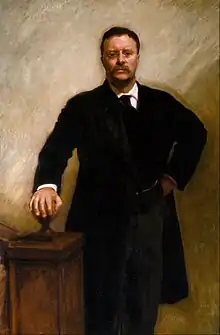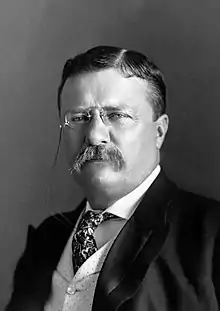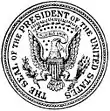Roosevelt Republican
Roosevelt Republican is a term used in discussions about politics of the United States to describe people with beliefs reminiscent of American President Theodore Roosevelt, a politician who spent much of his career as a Republican. Roosevelt's political positions were diverse but his name has been generally deployed by politicians who wish to publicly align themselves with Roosevelt's record of conservation.

In terms of specific policies, being a "Roosevelt Republican" has been described as supporting the conservation movement and having sympathies for environmentalist measures aimed at protecting natural landscapes. This is said to entail an emphasis on hunting and fishing along with wildlife tourism under the backdrop of government ownership of certain lands, with a more limited room for more invasive uses of public areas such as mining.[1]
Individuals who have self-identified as such include Ryan Zinke,[1] a Montana politician and U.S. Navy veteran who became the 52nd U.S. Secretary of Interior on March 1, 2017.[2] However, during his tenure as Secretary of the Interior, Zinke oversaw an aggressive expansion of industrial activity on public lands, including fast-tracking environmental reviews for oil and gas drilling[3] to increase the number of permits, proposing offshore oil drilling[4] on both the east and west coasts (an act that was opposed by governors of all 15 coastal states[5]), and the nation's first-ever reductions in the boundaries of national monuments[6] to favor utilization of the land by private companies involved in the oil and gas industry.
Former U.S Congressman and Governor of Florida, Ron DeSantis, has also referred to himself as "Teddy Roosevelt conservationist"[7] yet his voting record as a member of the House of Representatives indicates very little support for policies supported by environmentalists, earning him a ranking of 2% (out of a possible 100%) by the League of Conservation Voters.[8]
See also
- Conservation movement
- Politics of the United States
- Presidency of Theodore Roosevelt
- Rockefeller Republican
References
- Wolff, Eric (January 17, 2017). "'Roosevelt Republican' Zinke to face smooth path to Interior post". The Politico. Retrieved May 16, 2017.
- "Trump cabinet member trots through Washington on horseback". BBC News. 2 March 2017. Retrieved May 16, 2017.
- https://www.washingtonpost.com/news/energy-environment/wp/2018/02/01/trump-administration-tears-down-regulations-to-speed-drilling-on-public-land/
- https://www.americanprogress.org/issues/green/news/2018/06/04/451582/secretary-zinke-poised-give-breaks-drilling-industry-less-oversight-public/
- https://thinkprogress.org/ryan-zinke-still-wants-to-expand-offshore-drilling-despite-near-universal-opposition-b12e65062941/
- https://www.nytimes.com/2018/03/02/climate/bears-ears-national-monument.html
- https://www.orlandoweekly.com/Blogs/archives/2018/12/17/despite-his-terrible-environmental-record-desantis-calls-himself-a-teddy-roosevelt-conservationist
- http://scorecard.lcv.org/moc/ron-desantis

